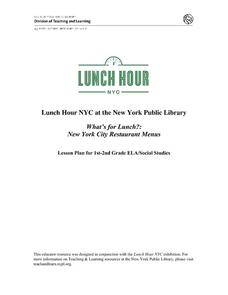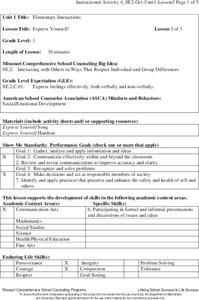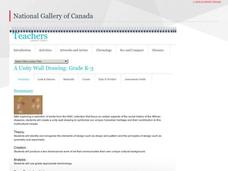Wish for the Future
Wish for the Future
What would be your class's ideal world 30 years in the future? What about 100 years? Use a series of activities to discuss globalization, sustainability, scientific contributions to society, and the global community of which your...
New York Public Library
What's for Lunch?: New York City Restaurant Menus
Do you remember the days when a cup of coffee cost five cents? At A.W. Dennett restaurant in 1894, you could buy a five-cent cup of coffee and as well as a five-cent slice of pie to accompany it. The menu from that year is a primary...
Austin Independent School District
Visual Discovery Note Taking Sheets
Step into history and step out with a new understanding of events. These strategies bring a new level of understanding of key events by asking viewers to engage in and respond to projected images. Complete directions for the activity, a...
Missouri Department of Elementary
Feeling Faces
A lesson help scholars identify emotions through facial expressions. After a friendly puppet reads scholars a poem all about feelings, learners act out how they would feel when a specific action happens to them. Participants watch and...
City University of New York
Women's Suffrage and World War I
Democracy cannot exist where not everyone has equal rights. Discuss the state of democracy and women's suffrage during World War I with class discussions, debates, and primary source analysis, in order for class members to connect...
City University of New York
Urban Politics: Machines and Reformers
Take a trip to the turn of the twentieth century with a resource about industrialism in America. With primary source documents and focus questions, learners think about the ways that government groups and organizations paved the way...
Missouri Department of Elementary
I’m A Star!
A lesson encourages scholars to be star community members. Pupils take part in a class discussion that challenges them to brainstorm at least two ways to show responsibility within one's community. Small groups play a game in which...
Missouri Department of Elementary
My Problem…Your Problem…Our Problem
Encourage sixth graders to take responsibility for their actions and become a problem solver. Pupils discuss new problems faced in sixth grade then identify ones that involve other people. A worksheet guides their practice in conflict...
Missouri Department of Elementary
Same and Different
A take on "If You're Happy and You Know It" opens a lesson about similarities and differences. Scholars speak in-depth on the unique characteristics that make up their classroom. The teacher or counselor records responses. Class members...
Missouri Department of Elementary
How Families Change
Changes in the family such as a new baby, divorce, a new job, or death are the focus of a lesson that examines how every family is different. Scholars draw a picture of their family then share the changes that have occurred within it....
Curated OER
Greek Pottery Designs
Get creative while exploring the art and history of the ancient Greeks. Learners create construction paper representations of Greek pottery, focusing on the differences between geometric and organic shapes. This project could enhance an...
Missouri Department of Elementary
Happy, Sad, Scared and Mad: All Belong To Me
"What are feelings?" and "Why are feelings important to understand?" are the essential questions of a lesson that boosts self-awareness. Scholars discuss the four basic emotions—happy, sad, scared, and mad—in preparation...
Missouri Department of Elementary
Express Yourself!
Encourage scholars to express themselves with help from an engaging song. Sung to the tune of "London Bridge is Falling Down," participants sing phrases that offer tips for dealing with emotions—sad, happy, worried, proud, mad, and...
Missouri Department of Elementary
Other Changes (Life-Changing Events Outside of the Family)
Change is inevitable. Kindergarteners discuss coping skills to properly manage changes that can occur outside the family. Scholars reflect on their life changes after starting kindergarten. They discuss their feelings and draw a...
Missouri Department of Elementary
Communicating with I-Messages (1/2)
Scholars watch two puppet dialogues illustrating negative and positive communication between friends. Then, they discuss how the puppets' communication skills influenced the outcome of each interaction.
Missouri Department of Elementary
Communicating with I-Messages (2/2)
Class members read a handout to learn about using I-Messages—honest statements that begin with I to get their points of view across. Next, learners practice using I-Messages with partners to better communicate without hurting...
Channel Islands Film
Telling Your Own Story
After watching and discussing a video on the Voyage of Cabrillo, individuals craft their own origin story and design and build an artifact they feel best represents their history.
Curated OER
Colored Pencil Repoussé
Artists employ a basic metalworking technique by embossing lines and textures into a soft metal. They look for examples of embossed metals in historical and contemporary examples. This fascinating process has been used by many cultures...
Curated OER
Greek Story Vases
There are so many ways to tell a story! Develop visual storytelling skills while facilitating an understanding of Greek art and culture. Learners design Greek style images to tell a story through art. They add their designs to Styrofoam...
Missouri Department of Elementary
Acting Out Respect and Compromise
Puppets showcase the importance of being a good friend. Following a discussion about positive character traits, scholars create a paper-bag puppet and role-play scenarios with a peer.
National Gallery of Canada
A Unity Wall Drawing
Build class community with an art project. Learners first examine and discuss works of art. They then contribute to a class mural by tracing their hands and decorating them in relation to their own cultures. The final mural...
Missouri Department of Elementary
Conflict Mediation – Part 2: Practice
A lesson challenges scholars to prove their understanding of conflict mediation. Small groups role-play scenarios using two mediators and two disputants. Peers observe then discuss their findings. A worksheet outlines groups'...
Missouri Department of Elementary
Conflict Mediation – Part 1: Getting Ready
Two scholars walk into a room arguing, what is happening? Peers observe the two actors in preparation for a whole-class discussion about conflict. Learners establish a conflict, name the three approaches—passive, aggressive, and...
Missouri Department of Elementary
Ingredients of a Relationship Recipe
An eye-catching hook makes a smart analogy between ingredients for a food recipe and ingredients for quality relationships. Scholars discuss and list qualities they feel contribute to positive interactions. Pupils create a recipe card...

























